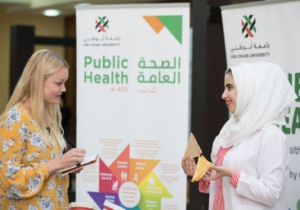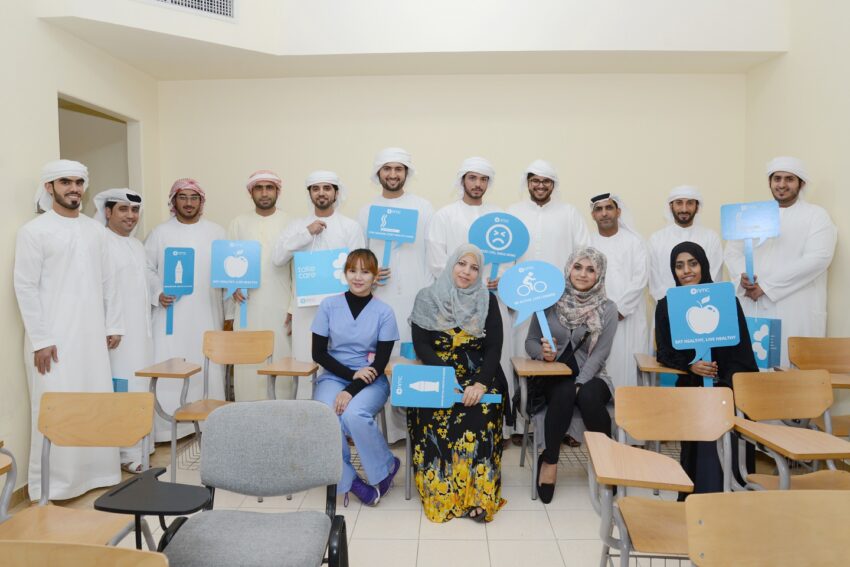Authored by: Humza Rana
Summary
Striving for a healthy way of living is a common aspiration among individuals. This endeavor becomes more achievable when the nation you reside in actively endorses healthy lifestyles and leads initiatives designed to facilitate this pursuit. The UAE has positioned itself as a leader in championing healthy living among its citizens and residents. This document is intended to highlight the diverse initiatives and strategies implemented by the UAE government to effectively advocate for healthier lifestyles across the country.
The World Health Organization characterizes Health Promotions as, “the process of enabling individuals to enhance their control over, and to better, their health. It transcends a mere focus on personal behavior, encompassing a broad spectrum of social and environmental measures.” It is vital for any nation to inform and educate its citizens and residents regarding the advantages of adopting healthy lifestyles in community settings, educational institutions, and workplaces.
The UAE serves as an exemplary model in fostering healthy habits as a collective society. This is evidenced by the numerous initiatives launched by the UAE government to elevate awareness on how healthy living should be embraced as a standard way of life.
Public Health Campaigns: Raising Awareness and Promoting Health in the UAE
Public health plays a pivotal role in shaping the well-being of any nation. In recent years, the United Arab Emirates (UAE) has risen to the forefront of global health initiatives, putting significant emphasis on health awareness and promoting healthier lifestyles among its citizens and residents. The UAE’s commitment to enhancing the health of its population through well-crafted campaigns and initiatives serves as a model for other nations in the region.
Government-Led Health Initiatives
The UAE government has implemented a variety of public health campaigns that focus on educating its citizens about the importance of maintaining a healthy lifestyle. These campaigns promote regular physical activity, healthy eating, mental well-being, and the reduction of non-communicable diseases such as diabetes, cardiovascular diseases, and obesity, which have become prominent in the region.
In particular, campaigns like “The Healthy Lifestyle Week” and “The National Nutrition Week” serve as prime examples of initiatives that target different aspects of health, from balanced diets to the promotion of regular physical exercise. These events are strategically designed to raise awareness, educate the community, and encourage individuals to take charge of their health and well-being.
Collaborations with International Organizations
The UAE’s collaboration with international organizations such as the World Health Organization (WHO) plays a significant role in shaping its health policies. The government integrates international health guidelines and campaigns while also aligning its goals with the global push for healthier populations.
One notable collaboration is the UAE’s involvement in the Global Action Plan for the Prevention and Control of Non-Communicable Diseases (2013–2020), an initiative spearheaded by WHO. The country supports WHO’s recommendations to tackle the rise of lifestyle diseases through more robust public awareness strategies and better accessibility to health services.

Public Health Education in Schools and Workplaces
One of the key areas where the UAE focuses its health awareness efforts is in schools and workplaces. The government has placed a strong emphasis on nutrition education and physical activities as part of the national curriculum, aiming to instill healthy habits early in life. Schools across the UAE regularly conduct health-focused activities, which encourage young people to make healthier choices and appreciate the significance of regular exercise.
In parallel, workplaces are also encouraged to adopt wellness programs for their employees. Health campaigns targeting smoking cessation, regular exercise, and balanced eating have found a prominent place in offices and workplaces. Additionally, mental health awareness is being promoted through specialized workshops and programs, recognizing the growing importance of mental well-being alongside physical health.
National Health Awareness Campaigns
The UAE regularly launches large-scale national public health campaigns that focus on specific health issues that affect the population. These include campaigns addressing smoking, diabetes, and heart health, all of which aim to reduce the prevalence of such diseases in the UAE.
The “Be Fit” initiative is one such campaign that encourages individuals to become more physically active, underscoring the long-term health benefits of incorporating exercise into one’s daily routine. Meanwhile, the “Healthy Eating” initiative provides citizens with essential information on proper nutrition, aiming to address the rise of obesity and other diet-related health conditions.
Digital Health Campaigns and Social Media Outreach
In today’s fast-paced world, digital platforms offer an unparalleled opportunity to reach diverse populations. The UAE’s health campaigns have leveraged social media and digital tools to spread awareness, with government health ministry’s actively engaging with citizens via Instagram, Facebook, and Twitter. Digital content such as videos, infographics, and health tips is shared regularly to engage different demographics and educate them about healthy lifestyles.
In addition, the use of health apps and wellness websites encourages individuals to monitor their health metrics, book regular checkups, and make informed decisions regarding their health. These resources make health information more accessible to people, empowering them to lead healthier lives.
Healthy Infrastructure and Urban Planning
In a bid to promote physical activity, the UAE has invested heavily in the development of infrastructure that supports an active lifestyle. The city planning projects focus on providing dedicated spaces for outdoor activities, such as walking paths, cycling lanes, and public sports facilities, ensuring that all age groups and fitness levels have access to places where they can stay active.
Moreover, the UAE’s cities, particularly Dubai and Abu Dhabi, are increasingly becoming more walkable, with a heightened focus on creating greener spaces. This urban transformation encourages a healthier population by ensuring that physical activity is easy and accessible for all residents.
A Long-term Vision for Health in the UAE
The UAE government’s commitment to health has been firmly encapsulated in its vision for the future. Health policies that promote healthy eating, active living, and disease prevention are integrated into broader national plans such as Vision 2021 and the National Agenda for the UAE. The aim is to elevate the quality of healthcare, promote longevity, and reduce the burden of preventable diseases by continuing to raise awareness, improve accessibility to health services, and create environments conducive to good health.
Through comprehensive public health campaigns, strategic collaborations, educational initiatives, and commitment to fostering a healthy environment, the UAE stands as a beacon of health promotion in the region, with its continued efforts expected to result in lasting positive outcomes for both the current and future generations.
In conclusion, the UAE’s focus on public health through awareness campaigns is laying the foundation for a healthier society. The nation’s ongoing efforts to foster a healthier lifestyle for its people represent a promising approach that can inspire other countries to invest in the health and well-being of their populations. By championing a collective commitment to health, the UAE is not only improving its healthcare landscape but also nurturing a resilient society that is well-equipped to thrive in the face of evolving health challenges.
While the UAE has made significant strides in promoting public health and wellness, several challenges persist in its efforts to ensure a healthier nation:
1. Lifestyle Diseases
Despite ongoing campaigns, lifestyle diseases such as diabetes, obesity, and heart conditions continue to be prevalent in the UAE. These non-communicable diseases are primarily linked to unhealthy diets, sedentary lifestyles, and high stress levels. Changing ingrained habits remains a constant challenge.
2. Cultural Attitudes
Cultural norms and traditions can sometimes be at odds with public health initiatives. For example, in certain communities, eating heavy meals high in fats and sugars is a deeply ingrained practice. Overcoming these cultural preferences in favor of healthier food choices requires comprehensive educational strategies that respect cultural sensitivities.
3. High Reliance on Fast Food
The UAE has a significant number of fast food outlets and processed food choices, which are often more convenient and affordable than healthier options. The rising reliance on such foods poses a challenge to achieving long-term health goals, particularly in terms of combating obesity and diet-related diseases.
4. Urbanization and Sedentary Lifestyles
The rapid urbanization of the UAE has led to more sedentary lifestyles, with many residents relying on cars rather than walking or using public transportation. With cities becoming more designed for driving than for walking, encouraging physical activity in daily routines remains a key challenge.
5. Lack of Awareness in Some Communities
Although many people in the UAE are increasingly aware of the importance of health, certain segments of the population, especially in more remote areas or among low-income workers, may not have access to the same level of information or resources regarding healthy living. Bridging the awareness gap and ensuring health education is accessible to all is an ongoing struggle.
6. Mental Health Stigma
Mental health issues remain a significant challenge in the UAE, often considered a taboo subject. Although awareness is growing, mental health is still not as prioritized as physical health in some communities. Removing the stigma around mental health discussions is key to encouraging more individuals to seek help when needed.
7. Healthcare System Capacity
Although the UAE has modern and advanced healthcare facilities, increasing population growth and the rising burden of chronic conditions might strain the system’s resources in the long term. It is essential for the health system to continue evolving to manage both preventive and curative care effectively.
8. Obesity in Children
Childhood obesity rates in the UAE have seen an increase, partly due to sedentary lifestyles and poor eating habits. Addressing childhood obesity through schools, family health education, and accessible recreational activities is critical to reversing this trend in the next generation.
9. Aging Population
As life expectancy increases and the population ages, the burden on public health systems for managing elderly care and age-related diseases intensifies. Preparing for an aging population with targeted healthcare strategies is a challenge that the country will continue to face.
10. Access to Healthy Foods
Even though the UAE’s supermarkets offer a wide range of healthy foods, price disparity remains a challenge. Healthier options tend to be more expensive, which makes it difficult for lower-income families to maintain a balanced diet.
Addressing these challenges requires a multi-faceted approach involving education, policy changes, cultural shifts, infrastructure improvements, and community engagement. The UAE government’s commitment to health promotion will be crucial in overcoming these obstacles, but continued efforts are essential to build a healthy and sustainable society.
Strategic Dialogues
Strategic dialogues and collaborations play a pivotal role in the effectiveness of public health initiatives. The Dubai Ministry of Health is actively connecting with various stakeholders, including governmental bodies, educational entities, private sector collaborators, and international health organizations. These dialogues aim to exchange knowledge, resources, and best practices to enhance public health goals.
By nurturing partnerships and collaborative initiatives, the MOH aspires to harness shared expertise and propel influential health policies and programs. This cooperative mindset guarantees that public health strategies are comprehensive and effectively respond to the varied needs of the community.
Conclusion
In conclusion, while the UAE has made substantial progress in promoting public health and healthier lifestyles through various campaigns and initiatives, challenges such as lifestyle diseases, cultural attitudes, urbanization, and mental health stigma persist. Overcoming these obstacles requires a comprehensive and ongoing effort from both the government and society as a whole. By continuing to promote awareness, improving access to healthier food and activities, and fostering a culture of well-being, the UAE can ensure a healthier future for its citizens and residents. The nation’s commitment to public health and wellness, combined with innovative strategies and inclusive efforts, will pave the way for a healthier, more resilient population.
Sources
- MONTGO Health INITIATIVE in UAE
- WHO – Global NCD Action Plan
- UAE Vision 2021 – Healthcare Goals
- MOHAP Official Website
- Dubai Health Authority Website
- Khalifa Foundation
- DoH Abu Dhabi
- SCAD Health Statistics
